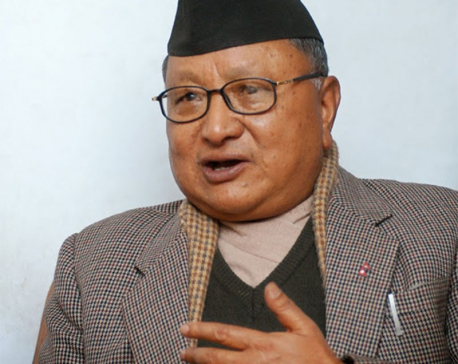
OR


Simone Galimberti
Simone Galimberti is the Co-Founder of ENGAGE, an NGO partnering with youths to promote social inclusion in Nepal.simone_engage@yahoo.com
Guardianship and special assistance to vulnerable families started by
the Prime Minister marks a noble beginning but it won’t be enough
The Global Action Week for Education 2018 ran all over the world from April 22 to 28 under the theme “Accountability for SDG4 through Citizen Participation” referring to Sustainable Development Goal (SDG) 4 aimed at ensuring inclusive and quality education that promotes lifelong learning opportunities for all. In the last few weeks, education has been at the center of national conversation and for many good reasons. First, chief ministers from the newly established provinces are coming up with bold statements for better education.
For example, Lalbabu Raut, Chief Minister of Province 2, is emphasizing on technical and vocational education. According to Raut promotion of technical education will be the focus of his administration.
Prithvi Subba Gurung, Chief Minister of Province 4, reaffirmed that each and every class and community in the society should have an access to quality education. While speaking in Pokhara recently he noted that seeking the attention of guardians and people in education field would help improve the quality of education. This time their focus seems to be more than “shooting up” number of students in primary schools.
We need strong rules to guarantee education to child domestic workers in Nepal.
What is truly emboldening and in stark contrast with the past is that even Prime Minister K P Oli himself seems truly involved in the campaign to enhance education? In his address to the nation on the occasion of Nepali New Year, PM reassured that no child will be left behind and all the children across the nation will be able to receive a quality education. More importantly, he launched a specific initiation where citizens are invited to support vulnerable children and their families for their education.
He followed through his actions by undertaking educational guardianship of two disadvantaged children—one from Siraha and other from Mugu. Former Prime Minister and Chairman of Maoist Center Pushpa Kamal Dahal also initiated the campaign by taking guardianship of two Dalit children in Chitwan. Such moves could go a long way in transforming education landscape of the country.
Just imagine if all cadres and mid-level and second-rung leaders from UML and Maoist along with their central committee members follow the steps of their respective leaders, thousands of deprived children would be able to attend schools. It can really trigger a big change in the society.
more to do
It would be more effective if the government at the central and provincial level coordinate specific actions to support parents in getting their children admitted in schools. According to news reports more than 5000 children in Kapilvastu are still deprived of right to education.
Quality education has become a national priority, but change can materialize within a short span of time if Nepal can drastically move on from current status quo. It is more relevant to reemphasize the importance of accountability as expressed in the Global Action Week for Education.
When we refer to accountability, I believe it is important because of two distinctive but correlated things: On the one hand, we need to ensure that resources are well spent and money from the national budget does not get wasted. On the other, we must enhance and strengthen education. Everybody should be concerned about the status of national education.
Guardianship and special assistance to vulnerable families as started by PM could be one of the ways but it is not enough.
A stronger doable action plan must be put in place. Child domestic work, once extremely common in the valley, is now reduced at a significant level. But it is still very strong in rural areas. There is a need for strong rules to guarantee the education of child domestic workers and those involved in the transportation sector.
Besides, misuse of scholarship funds is common in many community schools. What about establishing a citizen-led monitoring committee that looks after how scholarships for girls and Dalit students are administered? The second Global Education Monitoring Report (GEM) entitled “Accountability in education: meeting our commitments” was published by UNESCO last October. Its basic tenet was that the responsibility to ensure the delivery of quality education is not just the “teacher’s job” but a collective responsibility for which every single citizen should stand up.
Stay committed
Few months ago the government pledged to increase education budget up to 20 percent of the total national budget. The pledge was made during the international funding conference of the Global Partnership for Education (GPE) held in February in Dakar, the capital of Senegal. Our focus should not be only on increasing budget. Nepal is entering a new era and we need to be bold and get rid of past injustices.
Education Minister Giriraj Mani Pokharel has recently announced a very comprehensive and ambitious plan for the next five years. It can materialize only if we all play our part. Only truly committed teachers should be allowed to teach and entrusted with one of the biggest imaginable responsibilities of imparting quality education. Only truly passionate civil employees will be able to take actions at policy level and ensure a solid implementation at the grassroots level.
Only genuine and patriotic private education entrepreneurs who care for their nation will think of new “win win” solutions to harness new partnerships and bring novel solution to make education a common good for all. It is truly a common responsibility.
The author is the Co-Founder of ENGAGE, an NGO partnering with youths living with disabilities simone_engage@yahoo.com
You May Like This

Education minister brings roadmap for education sector
KATHMANDU, April 11: Minister for Education, Science and Technology (MoEST) Giriraj Mani Pokharel on Wednesday unveiled a seven-page roadmap for... Read More...

State-Minister for Education Adhikari bats for education reform
CHITWAN, Sept 27: State-Minister for Education, Sheshnath Adhikari, has given a clarion call to the concerned authorities to bring about... Read More...

Rights of every student to quality education secured: Education Minister Shrestha
KATHMANDU, June 14: Deputy Prime Minister and Education Minister, Gopalman Shrestha has said that the right of every student of... Read More...





Just In
- MoHP cautions docs working in govt hospitals not to work in private ones
- Over 400,000 tourists visited Mustang by road last year
- 19 hydropower projects to be showcased at investment summit
- Global oil and gold prices surge as Israel retaliates against Iran
- Sajha Yatayat cancels CEO appointment process for lack of candidates
- Govt padlocks Nepal Scouts’ property illegally occupied by NC lawmaker Deepak Khadka
- FWEAN meets with President Paudel to solicit support for women entrepreneurship
- Koshi provincial assembly passes resolution motion calling for special session by majority votes






_20220508065243.jpg)






Leave A Comment